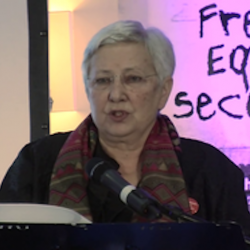The murder of Kurdish Iranian 22-year-old Mahsa Jina Amini for a few strands of hair by the Islamic regime of Iran’s morality police on 16 September 2023 has sparked a woman’s revolution in Iran. The slogan ‘Woman, Life, Freedom,’ first raised in Rojava, has become a universal slogan inspiring the world via the Mahsa Jina revolution.
You could say, it’s raining women’s revolutions in the region.
Despite the Islamic regime of Iran’s suppression using weapons of war, killing of over 500 protestors, imprisoning 18-20,000 protestors, using rape as a weapon of suppression, and even gassing over 5,000 girls at schools across Iran, the revolutionary uprising and resistance continues.
Its manifestations are everywhere, including with ongoing weekly Friday protests in Baluchestan. In the run up to International Workers Day, 1 May, workers in over hundred factories and plants in the oil, gas, steel, petrochemical and other industries began a strike in nearly 40 cities in 13 provinces for better work and living conditions. These are key industries that will place even more pressure on the regime. Another recent example is the pre-Islamic Iranian New Year Nowruz marking the advent of Spring being celebrated in protest at the graves of those killed, including at that of Mahsa Jina Amini’s. Funerals or memorials are no longer sites of religious mourning but of protest dancing, singing and slogans, hair cutting, applause to honour the person killed and sheer defiance. Women and girls are walking the streets unveiled, even though the regime has threatened to prosecute them ‘without mercy.’ Political prisoners shout slogans in support of the revolution as soon as they are released. A case in point is labour activist Sepideh Qoliyan. Upon release after nearly 6 years in prison, she shouted ‘Khamenei the tyrant; we will bury you.’ She was promptly rearrested and is back at Evin Prison.
Significantly, an historic Woman, Life, Freedom Charter of Minimum Demands of 20 Independent Trade Unions and Civic Organisations has been published in Iran in February calling for an end to executions and torture, equality, freedom of political prisoners, secularism, religion as a private affair and for freedom of expression and conscience, amongst others.
A Charter of Progressive Women published on 8 March, International Women’s Day, is calling for an end to sex apartheid, the right to safe abortions, prohibition of child veiling, equality in all spheres…
This is a modern, secular, anti-clerical revolution led by a Generation Z with no illusions towards an Islamic state. They want an end to theocracy and they want it now. This is the beginning of the end for the regime. It is a revolution that needs to be supported, strengthened, and encouraged because it will herald a new dawn for people in the region and across the globe.
Despite the hopeful possibilities for fundamental revolutionary change, victory is not guaranteed. There are forces at work endeavouring to hijack the revolution. A major concern is Reza Pahlavi, the former dictator’s son who is putting himself forward as the only alternative. His Charter (repugnantly named the Mahsa Charter even though it is an attempt at derailing the Mahsa revolution) is a manifesto of empty promises and opportunism, issued with a handful of other like-minded personalities such as Masih Alinejad, Shirin Ebadi, Nazanin Boniadi and Hamed Esmaeilion.
Compare Pahlavi’s Charter with those that have come out of the long struggles of women’s liberation, civil and trade union organisations in Iran. The Iranian charters are a battle cry for revolution and fundamental change. Pahlavi’s is addressed to Western governments to plead his case as their alternative. It’s an exercise in manipulation.
Take, for example, the reference to joining international conventions as its main human rights ‘promise’ despite the fact that most international human rights instruments are non-binding. Even if they are, governments can have innumerable exemptions that empty them of any substance. The Convention on the Elimination of Discrimination Against Women (CEDAW), for example, which is one of the few that is legally binding, has the most religious and cultural exemptions of any Convention.
His interviews and speeches reveal his real aims. At a National Union for ‘Democracy’ in Iran event he states there is no longer any need for protests. He says: ‘…protests every single day for months at a time. It’s unrealistic nor is it in that sense necessary. Because the protests had to send a clear message to the world. That we want an end to this regime. Now, would you rather see our children being shot in the eye or poisoned by chemical attacks?’ As if protesting is the cause of our children being shot and killed. He wants the protests to take a backseat so he can focus on regime change from above with (he hopes) the help of Western governments that have a history of interventions in Iran.
It was this very intervention in 1979 which paved the way for an Islamic regime that suppressed the Iranian revolution. This was during the Cold War when US-led foreign policy was arming and training Islamist forces as a bulwark against the Soviet Union. Faced with a left-leaning revolution in Iran at the time, western powers decided in Guadeloupe that they would no longer support their Shah’s dictatorship and instead welcome Khomeini and an Islamic Republic. The Shah’s strengthening of Islamist forces to suppress progressive movements in Iran made this a viable option.
Pahlavi hopes that like in the past, Western powers will help pave the way for his ‘return’ to power. His charter and various unity conferences – with the same handful of people – are aimed at persuading said powers to make him their next alternative. [Since writing this, the Unity group has already fallen apart, with Hamed Esmaeilion resigning and others issuing statements without Reza Pahlavi.] Of course, Western powers are still invested in the Islamic regime but as soon as the regime is sufficiently weakened or overthrown, Pahlavi is banking on their siding with him and not the revolutionary forces in Iran.
His grandfather Reza Shah and his father Mohammad Reza Shah came to power that way, via coups supported by Western governments, so why not him? The Pahlavi reign is a reign of coups, maintained via suppressing, imprisoning and murdering progressive voices. Many of the former Shah’s SAVAK secret service were integrated into the Islamic regime’s SAVAMA. Hence why his Charter is full of loopholes and empty promises to ensure he can do as he needs once in power.
This explains why Reza Pahlavi’s Charter calls for the integration of the IRGC (Islamic Revolutionary Guard Corps) into the army. In interviews, he has said that he will rely on the Pasdaran of Islamic revolution and Basij to secure the country after the ‘collapse’ of the regime, forces that are despised and at the forefront of suppression. This is in direct contradiction to calls inside and outside Iran to proscribe the IRGC as a terrorist body. The Woman, Life, Freedom Charter of Minimum Demands of 20 Independent Trade Unions and Civic Organisations in Iran has called for ‘the dissolution of all repressive apparatus.’ Reza Pahlavi wants to integrate them into his army. Repressive forces will be useful to him as they were to his family.
Like grandfather and father, like son.
Reza Pahlavi’s dream of regime change from above is so great that he has even asked for people’s power of attorney, which has embarrassingly (for him) backfired. Only 450,000 handed him power of attorney, out of a population of 88 million in Iran and 4 million in the Diaspora. Why would those fighting for a revolution give their decision-making authority to anyone, let alone someone whose only claim to fame is that his dad was a former dictator?
This doesn’t stop the Iranian media abroad like Voice of America, Manoto, Iran International, Independent Persian from shamelessly aiding in manufacturing consent and engineering regime change from above. (BBC Persian is still promoting factions of the Islamic regime.)
He and the same few cohorts keep speaking of unity but what they really mean is unity under Reza Pahlavi. End of. They are already calling him ‘Prince Pahlavi.’ And anyone critical of this engineering from above is met with accusations of being an agent of the regime and causing division by his supporters, some of whom are far-Right fascists. This includes using threats and violence against critics and at protest rallies in the Diaspora. He and his cohorts have singlehandedly ended the biggest mass protests in Diaspora history after his supporters drowned out defence for the Mahsa Jina revolution with ‘Long Live the Shah’ and flooded protests with his and his family’s photos. His supporters regularly push out those with flags of other political groups or Kurdish and LGBT flags. They have even destroyed the PA system of those opposed to the monarchy… and these are only examples of what I have seen myself at protests in London. See some of the online threats I have received as an example. Pahlavi’s catchword ‘unity’ really means united behind his rule – or else his goons will make sure to take care of things for him.
Yasmine Pahlavi, his wife, has been even clearer about what ‘Prince Pahlavi’s’ rule will mean for the people of Iran. She isn’t restricted as he is by the need to obfuscate their politics in democratic language to dupe the public. Reza Pahlavi not only doesn’t contradict what she says, he ‘likes’ her comments and posts on social media. For example, in response to someone shouting ‘Death to Oppressor, whether Shah (the former Dictatorship) or Leader (Khamenei)’ at a protest in the US, a slogan also shouted in Iran, she tells someone who responds ‘Death to Stalin, Death to Lenin:’ ‘They are dead; death to those who are still here.’ Clearly, there is a huge difference between saying death to oppressor versus saying death to those who are Left-leaning. It’s no wonder Parviz Sabeti, a notorious SAVAK intelligence chief (the Shah’s secret police) made his first US public appearance at an LA rally or that Reza Pahlavi’s supporters have been glorifying SAVAK’s role in suppressing dissent during the former dictatorship.
In a live discussion when Hamed Esmaeilion (one of his unity cohorts who has recently resigned) speaks about the need for justice and accountability for People’s Mujahedin Organisation of Iran (MEK in Persian) members executed in the 1980s, Yasmine Pahlavi writes: ‘I’m not clear why time is being spent in this forum to speak about justice for MEK families. I think Mr Esmaeilion should focus his time on the families of the victims of the Mahsa Amini revolution.’ The lack of respect for justice and human rights for all, including opponents, tells us all we need to know about their future commitment to human rights and freedoms.
A slogan that monarchists are shouting at rallies in various cities is also telling: ‘Our Leader is Pahlavi; whoever doesn’t say it is a foreigner’ (Rahbar e ma Pahlavi e, Har ky nageh, ajnabie).
His cohorts in ‘unity,’ namely Masih Alinejad’s historical revisionism helps to aid this manufacturing from above. She blames those who fought for the 1979 revolution against the Shah’s dictatorship for bringing the Islamic regime of Iran to power without any reference to Western government intervention or the former Shah’s promotion of religion and clericalism whilst she works with Pahlavi to whip up Western government support for his agenda. Always an opportunist that gravitates towards sources of power, it wasn’t very long ago when she was opposing boycotting the Islamic regime’s farcical ‘elections.’
All this, even before Reza Pahlavi is in power. Imagine what will become of his talk of democracy and human rights if he ever is.
For those of us who remember the 1979 revolution and how it was expropriated and suppressed, this all very déjà vu. But it is also a different Iran, one in which women’s liberation and civic and trade organisations issue historic rights charters and young revolutionaries know the society they want. In an age of social media, the mainstream pro-Pahlavi media are not the only ones that have access to public opinion. The revolution cannot be easily confined and distorted.
Moreover, there is the People’s Mujahedin Organisation of Iran (also known as Mujahedin e Khalq) that is of concern as they too have many Western government backers but they are discredited due to their having joined forces with Iraq during the Iran-Iraq war. As a religious group with all women members veiled, they are also irrelevant in the current anti-clerical and woman-centred revolution.
What is to be done given these threats? The Mahsa Jina revolution is too important for the women and people of Iran, the region and world to be derailed by would be dictators and policies that put profit before people’s rights and welfare. All those in favour of a woman’s revolution must remain vigilant, keep the focus on the demands of women and people in Iran, on woman, life, freedom and to expose attempts at regime change from above. A priority now too is putting pressure on western governments to stop supporting the Islamic regime but also to stop it from any interventions in favour of regime change from above.
An Islamic regime that came to power by imposing the veil with acid attacks and violence can come to an end with free women tearing off their veils and lighting them ablaze. The question each of us must answer is, which side we are each on. There is only one right answer: on the side of the women’s revolution in Iran, certainly not more of the same old, same old.
This article was written and will be published in Italian for MicroMega in end May.
Author
-
Maryam Namazie is the Spokesperson of the Council of Ex-Muslims of Britain and One Law for All.

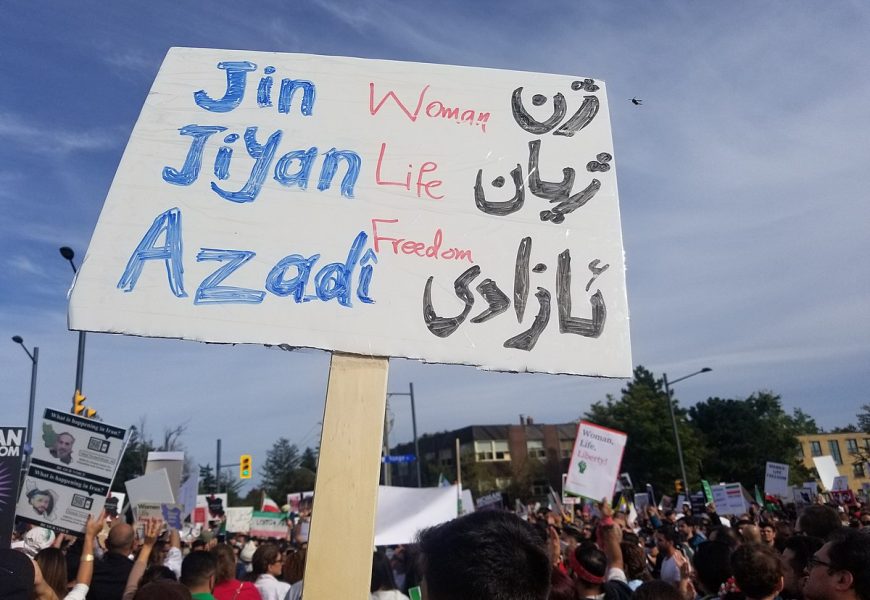

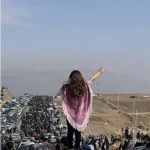
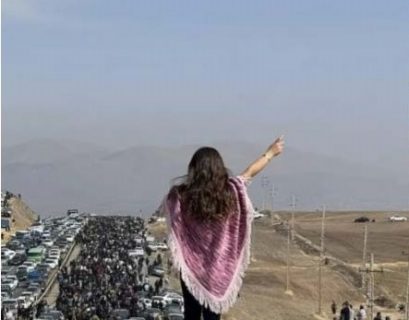
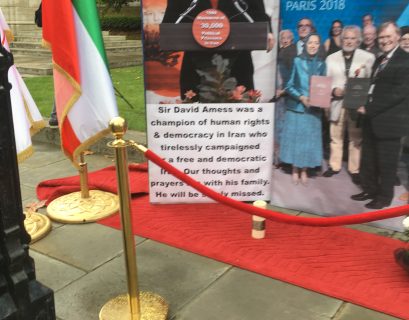
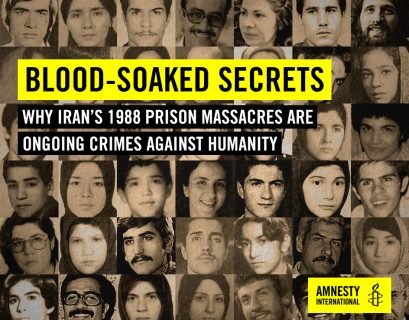
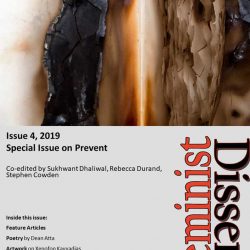
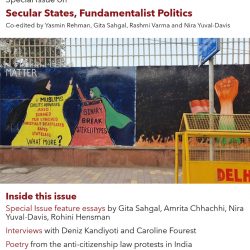

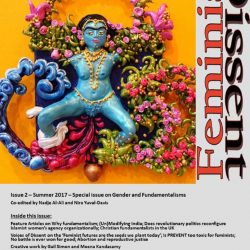

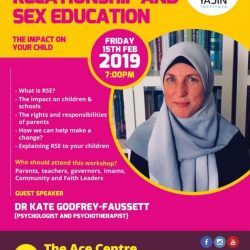
.jpg)
